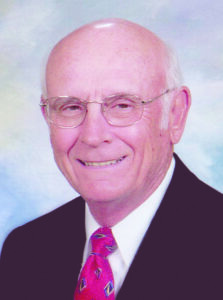Headlines
Dunagin: Trump Pays Back to Evangelicals
Only God knows Donald Trump’s spiritual relationship with the Almighty, but much of his rhetoric goes against the grain of New Testament theology as taught by Jesus. The Republican nominee for president comes up way short of being defined as one who “turns the other cheek.”
But that hasn’t stopped him from gaining considerable support from the Christian community, especially those on the right.
Near the conclusion of his acceptance speech at the Republican National Convention last week, Trump singled out “the evangelical and religious community” for their assistance in getting him nominated.
“They have much to contribute to our politics, yet our laws prevent you from speaking your minds from your own pulpits,” he said. “An amendment, pushed by Lyndon Johnson many years ago, threatens religious institutions with a loss of their tax-exempt status if they openly advocate their political views. Their voice has been taken away,” Trump said. “I am going to work very hard to repeal that language and to protect free speech for all Americans.”
What Trump was referring to is not an amendment to the constitution but a law advocated by Johnson in 1954, when he was a U.S. senator running for re-election. A conservative nonprofit group that wanted to limit the treaty-making ability of the president produced material that called for electing Johnson’s primary opponent, millionaire rancher-oilman Dudley Dougherty. There was no church involved.
According to PoltiFact, Johnson, then-Democratic minority leader, responded by introducing an amendment to Section 501(c)(3) of the federal tax code dealing with tax-exempt charitable organizations, including groups organized and operated exclusively for religious, charitable, scientific, literacy and educational purposes, or to prevent cruelty to children or animals. It said, in effect, that if you want to be absolved from paying taxes, you couldn’t be involved in partisan politics.
Violating the restriction could result in the revocation of the organization’s tax-exempt status and the imposition of taxes, but that hasn’t stopped some church leaders from outright ignoring the restriction or skirting around it. For example, Robert Jeffress, the senior pastor of First Baptist Church in Dallas, came out for Trump earlier this year individually but not on behalf of his congregation.
Truth be known, the restriction often has been violated without any kind of opposition by the IRS, and preachers supporting both Democrats and Republicans have gotten by with doing so. But the threat of losing tax-exempt status persists as long as the law is in place, and politically-minded religious groups, particularly evangelicals, have regarded it as a suppression of free speech and an entanglement of the IRS in the operation of their religion. That’s why Trump spoke out against the law and why its repeal is written into the Republican platform.
Contrary to arguments of those advocating abolishing the law, it does not restrict anyone’s right of free speech. It just means they may not be able to exercise that right without giving up a tax exempt status for their institution.
Should it be repealed? An argument can be made both ways. The best one against repeal is the question: “Do we really want to turn churches into political action groups?”
Charles Dunagin is a retired editor and publisher who is currently residing in Oxford, Mississippi. He can be reached at cdunagin@enterprise-journal.com.
Follow HottyToddy.com on Instagram, Twitter and Snapchat @hottytoddynews. Like its Facebook page: If You Love Oxford and Ole Miss…















